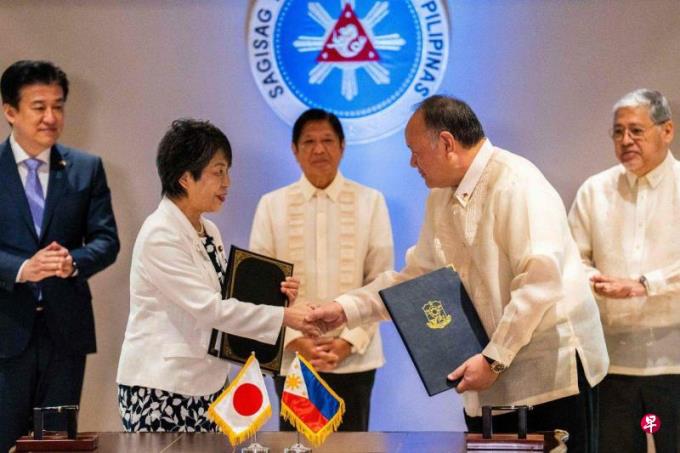
(Manila Comprehensive) The Philippines and Japan officially signed an agreement between the troops, allowing the two countries to deploy troops and armaments in the other side of each other to do exercises and disaster relief.
The Philippine Defense Defense Dorodro and the Japanese Foreign Minister Uenagawa Yoshiko on Monday (July 8) on behalf of the two countries signed a mutual access agreement on behalf of the two countries (also known as the mutual visits of the army), the President President Kodo KocoSri Lanka is present.The agreement will take effect after approval of the two countries.
Uenagawa Yoshiko described this agreement as a "milestone achievement"."This is another milestone we worked together to maintain the rules -based international order."
The Philippine Day began to negotiate this agreement on November last year. The agreement provides defense officers to the opponent's land to train and launch other actions to provide a legal foundation.According to the agreement, Japan can also officially participate in the "side" of the United States and Philippines.The Japanese Self -Defense Force previously participated as an observer.
Japan signs a mutual visit agreement with Australia and the United Kingdom, and it is the first time to sign a similar agreement with Asian countries.The Philippines and the United States and Australia also have similar agreements.
The Philippines and Japan are intimate ally in the United States in Asia. China ’s influence in the Indo -Pacific region has increased day by day, and it has promoted the search for security cooperation in the United States and the Philippines.
Uenagawa Yoshiko and Japanese Defense Minister Muhara Kani held a "two -plus and two" talks with Foreign Minister Manlo and the Defense Director specially.The Philippine Ministry of Foreign Affairs said before the meeting that the discussions between the two sides focused on the East China Sea, the South China Sea and the Korean Peninsula.
The Philippines and Japan both have maritime sovereignty disputes with China.The Philippines has sovereignty disputes in the South China Sea, and Japan has sovereignty disputes with China on the islands of the East China Sea Tsimeri (known as the Diaoyu Islands).On the sovereignty of the South China Sea, Japan stated that it supported the Philippines and expressed serious concerns about the recent collisions between the Philippine vessels that caused the Philippine ship and injured the Philippines.
Muhara said at a press conference: "The Philippines and other Southeast Asian countries are in the throat of the Japanese maritime route; it is important for Japan to promote defense cooperation and exchanges with the Philippines."
Uenagawa Yoshiko reiterated the importance of peace and stability in the Indian area, and showed that Tokyo opposed "an attempt to change the status quo by unilateral force and coercion means."
The Asia -Pacific policy in the United States will change Japan to seek a larger role in the future
Analysts pointed out that Japan is worried that the Asia -Pacific policy in the Asia -Pacific region may change in the future, so it is seeking to play a greater role in regional security.
Hall, a professor of international relations at the University of Greeis University in Australia, said that China would be annoyed by this agreement, and the United States would be happy."Whether it is Trump or Biden, the United States has been encouraging regional allies to carry out cooperation to assume more responsibility for maintaining regional security. New troops mutual visits will help this process."
Lin Jian, a spokesman for the Chinese Ministry of Foreign Affairs, responded at a regular press conference on Monday that exchanges and cooperation between the country should not damage the mutual understanding and trust between the countries in the region, the peace and stability of the region should not be destroyed.For third parties or damage the interests of third parties.
"The Asia -Pacific region does not need a military group, let alone the 'small circle' of camp confrontation and encourage the new Cold War. Any behavior that damages the peace and stability of the region, and destroy the unity and cooperation of the region will lead to the vigilance of the people and the people of the region.Oppose "




